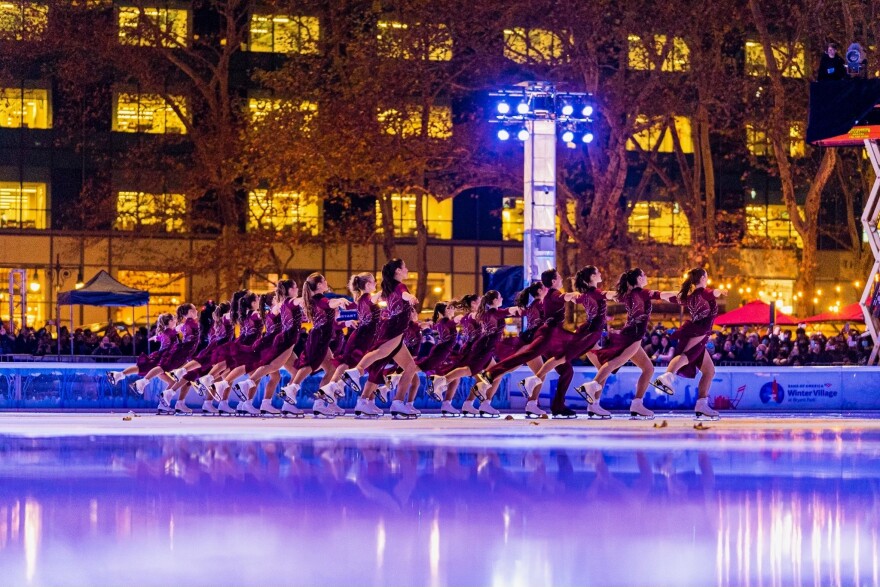Under the crack of fireworks, this year's Winter Olympics will come to an end at Sunday's closing ceremony. As is customary, the Olympic flag will be passed to the Italian cities of Milan and Cortina d'Ampezzo, which are set to host the Winter Games in 2026.
Maybe that'll be Carmela Mariz Olarte's shot. The competitive skater says it's her "No. 1 dream" to compete in the Olympics.
But there's an extra hurdle to overcome: her sport, synchronized skating, is not an Olympic competition.
"I think that's anyone's dream when they go into the sport," says Olarte, who skates for a Boston-area synchronized skating team called the Haydenettes. "That's also another question that people ask, like 'Oh, are you going to the Olympics?"
Much like synchronized (or artistic) swimming in the Summer Games, synchronized skating brings teams together to perform formations and step sequences. They skate in "perfect unison," said Saga Krantz, who coaches the Haydenettes.
The sport has for years held competitions in the U.S. and around the world, but a push has been underway by the International Skating Union, the governing body for competitive skating, to find a permanent place in the Olympics for synchronized skating.
What it takes for a sport to make it to the Olympics
To become an Olympic sport, the International Olympic Committee's executive board would need to propose it, and the rest of the IOC would then have to hold a vote. It's how breakdancing was added to the lineup for the 2024 Summer Games in Paris.
Ahead of the Beijing Games, the International Skating Union announced the appointment of a working group to "investigate, strategize and gather the information required for Synchronized Skating to be accepted as an Olympic discipline" in Beijing. The sport didn't make the cut this year, but U.S. Figure Skating says it stands strongly in favor, according to a statement provided to NPR.
"U.S. Figure Skating strongly supports the addition of synchronized skating to the Olympic Program," the national governing body said in a statement.
It's hard to tell when any decision will be made one way or the other, so for now, competitive synchronized skaters say they are focused on continuing to improve — whether at the Olympic level or not. But the Olympic dream remains.
"It kind of is in the back of our heads," Olarte says. "But when [an Olympic debut] gets brought up, we have this little hope."

Krantz says she thinks an Olympic debut could be "getting very close."
"The time that we train these days, the amount of hours, the type of training that we do is equal to the singles and pairs dance," Krantz says.
Still, the sport will have multiple hurdles to overcome before it can reach the Olympic stage. The IOC considers new sports based on 35 criteria, including how many athletes and officials would be included; how popular the sport is in the host country and what type of revenues it might generate.
The Haydenettes have participated in every world championship since the International Skating Union's first World Synchronized Skating Championships were held in in 2000. The squad has won medals five times at the world level and have been national champions more than two dozen times.
The sport is much different than it was two decades ago, says Krantz. Over the years, the number of skaters on the ice has decreased to 16 from 32, Krantz notes. The International Skating Union is also testing the sport with 12 skaters.
The training, she says, has also become more serious over the past five years.
The team is trying to stay in the moment
But a push to reach Olympic status doesn't define them, she says.
"We're quite comfortable and happy where we are as athletes," Krantz says. "We're in a very good place right now where we just want to continue to train and simply to see if the opportunity comes to make it happen at the Olympics."
For now, the team is preparing for a national competition in Colorado Springs for a chance to compete in World Championships in April.

Carly Muñoz, a skater with the Haydenettes, first started skating when she was four years old. After watching a local synchronized skating team when she was six, she was "captured by the magic." She hasn't looked back since.
Now 23, Muñoz says she's not just competing for a shot at the Olympics. She's competing for herself and her team, she says, to be the best skater she can be.
"That's a process that never stops," she says. "We can always do better than what we were yesterday or what we were last year."
But the Olympic dream lingers. It would be "incredible to compete," she says.
Copyright 2022 NPR. To see more, visit https://www.npr.org.


